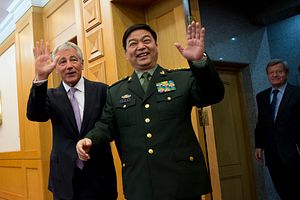U.S. Defense Secretary Chuck Hagel continued his China tour today, holding discussions with Chinese military leaders in Beijing. As expected, those talks (at least the aspects that were made public) were rocky, with each side seeming more interested in hammering home its well-known positions rather than holding a dialogue.
Hagel’s tour started out on a high note, with the U.S. Defense Secretary becoming the first foreign observer to tour China’s aircraft carrier. Chinese media outlets trumpeted the visit as a triumph of Chinese transparency. A piece in China Daily called Hagel’s time aboard the Liaoning “only one of many strides China has taken to assure the international community of its good faith in defense.” U.S. officials also seem to have accepted the tour as a positive sign, with one military official telling Reuters the Liaoning tour was “an honest, genuine effort to be open.”
Still, for some U.S. analysts (including The Diplomat’s Harry Kazianis), the gesture only underscored how far China has to go with military transparency. The U.S. often nudges China in public remarks to be more open about its military capabilities and intentions. Incremental progress on this front hasn’t done much to stem U.S. criticism. The U.S. argues that an increase in Chinese transparency could reduce tensions in the area by reassuring China’s neighbors that its military build-up is in fact defensive in nature.
Meanwhile, China also has a bone to pick with the United States. As the China Daily article put it, China’s “core interests in safeguarding sovereignty and territorial integrity seems [sic]… insufficiently appreciated by the United States.” To leaders in Beijing, U.S. criticism over China’s actions in the South and East China Seas is only the latest evidence that Washington has little respect for China’s “core interests.” For decades, the U.S. has continued selling arms to Taiwan and having leaders meet with the Dalai Lama despite China’s repeated expressions of dismay. This, in turn, means China has little incentive to trust Washington’s assertions that it is not trying to contain China and in fact welcomes China’s rise.
One thing stands out about such rhetoric—both China and the U.S. are playing a game of “hot potato” over who is to blame for a recent increase in tensions. For U.S. officials (and their counterparts in Japan and the Philippines), it’s blindingly obvious that recent tensions are a result of China’s military build-up, coupled with a new aggression over its territorial claims. To Chinese policymakers, though, it’s just as obvious that the U.S. is the culprit, as its “pivot to Asia” policy encouraged its allies to provoke China. Conveniently, by holding on to these positions the U.S. and China can absolve themselves of blame, and put the onus for resolving tensions on the other party.
This game of “hot potato” played out as expected in Hagel’s press conference with Chinese Defense Minister Chang Wanquan. The two butted heads over who is to blame for rising tensions over territorial disputes. Chang said that the U.S. should act to restrain, not to support Japan. “It is Japan who is being provocative against China,” said Chang, adding that the U.S. should “keep (Japan) within bounds and not to be permissive and supportive.” Fan Changlong, the vice-chairman of China’s Central Military Commission had a similar message. He bluntly told Hagel that “the Chinese people, including myself are dissatisfied” with Hagel’s “tough” remarks to his counterparts from Southeast Asia and Japan.
To drive home his point, Chang paraphrased Xi’s famous line from the March National People’s Congress, saying that China “will neither compromise on, concede or trade on territory and sovereignty, nor tolerate them being infringed on even a little bit.” The message was clear: China will not change its approach, so the U.S. should encourage its allies to change theirs.
Hagel, for his part, reaffirmed the U.S. commitment to its treaty allies and said that no country should use “intimidation, coercion, or aggression to advance their claims”—a thinly veiled rebuke of China. Hagel also used China’s 2013 declaration of an air defense identification zone in the East China Sea as an example of destabilizing behavior from Beijing. “Every nation has a right to establish an air defense zone, but not a right to do it unilaterally with no collaboration, no consultation,” Hagel said. “That adds to tensions, misunderstandings, and could eventually add to, and eventually get to, dangerous conflict.” In other words, China is the one at fault, and thus the one who needs to change its approach.
While both Hagel and Chang at least paid lip service to the need for greater military cooperation and mutual trust, the underlying message was worrying. Both China and the U.S. recognize the danger of the current situation, but are unwilling to take any responsibility for changing their own actions to minimize tensions.

































